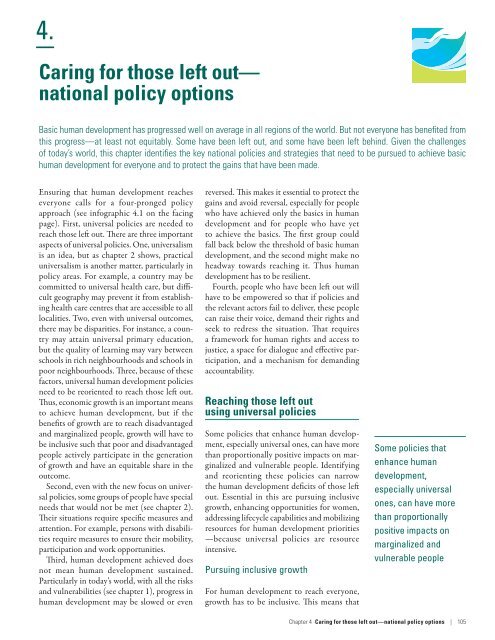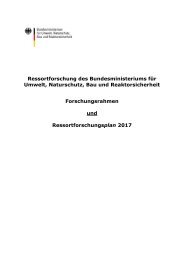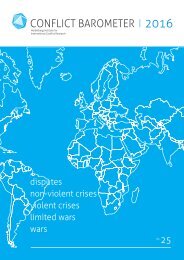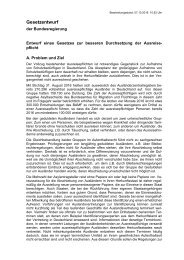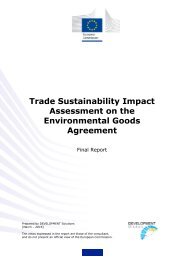Human Development Report 2016
6Tyccfrzw
6Tyccfrzw
Create successful ePaper yourself
Turn your PDF publications into a flip-book with our unique Google optimized e-Paper software.
<strong>Human</strong> <strong>Development</strong><br />
4.<br />
<strong>Report</strong> <strong>2016</strong><br />
<strong>Human</strong> <strong>Development</strong> for Everyone<br />
Caring for those left out —<br />
national policy options<br />
Basic human development has progressed well on average in all regions of the world. But not everyone has benefited from<br />
this progress—at least not equitably. Some have been left out, and some have been left behind. Given the challenges<br />
of today’s world, this chapter identifies the key national policies and strategies that need to be pursued to achieve basic<br />
human development for everyone and to protect the gains that have been made.<br />
Ensuring that human development reaches<br />
everyone calls for a four-pronged policy<br />
approach (see infographic 4.1 on the facing<br />
page). First, universal policies are needed to<br />
reach those left out. There are three important<br />
aspects of universal policies. One, universalism<br />
is an idea, but as chapter 2 shows, practical<br />
universalism is another matter, particularly in<br />
policy areas. For example, a country may be<br />
committed to universal health care, but difficult<br />
geography may prevent it from establishing<br />
health care centres that are accessible to all<br />
localities. Two, even with universal outcomes,<br />
there may be disparities. For instance, a country<br />
may attain universal primary education,<br />
but the quality of learning may vary between<br />
schools in rich neighbourhoods and schools in<br />
poor neighbourhoods. Three, because of these<br />
factors, universal human development policies<br />
need to be reoriented to reach those left out.<br />
Thus, economic growth is an important means<br />
to achieve human development, but if the<br />
benefits of growth are to reach disadvantaged<br />
and marginalized people, growth will have to<br />
be inclusive such that poor and disadvantaged<br />
people actively participate in the generation<br />
of growth and have an equitable share in the<br />
outcome.<br />
Second, even with the new focus on universal<br />
policies, some groups of people have special<br />
needs that would not be met (see chapter 2).<br />
Their situations require specific measures and<br />
attention. For example, persons with disabilities<br />
require measures to ensure their mobility,<br />
participation and work opportunities.<br />
Third, human development achieved does<br />
not mean human development sustained.<br />
Particularly in today’s world, with all the risks<br />
and vulnerabilities (see chapter 1), progress in<br />
human development may be slowed or even<br />
reversed. This makes it essential to protect the<br />
gains and avoid reversal, especially for people<br />
who have achieved only the basics in human<br />
development and for people who have yet<br />
to achieve the basics. The first group could<br />
fall back below the threshold of basic human<br />
development, and the second might make no<br />
headway towards reaching it. Thus human<br />
development has to be resilient.<br />
Fourth, people who have been left out will<br />
have to be empowered so that if policies and<br />
the relevant actors fail to deliver, these people<br />
can raise their voice, demand their rights and<br />
seek to redress the situation. That requires<br />
a framework for human rights and access to<br />
justice, a space for dialogue and effective participation,<br />
and a mechanism for demanding<br />
accountability.<br />
Reaching those left out<br />
using universal policies<br />
Some policies that enhance human development,<br />
especially universal ones, can have more<br />
than proportionally positive impacts on marginalized<br />
and vulnerable people. Identifying<br />
and reorienting these policies can narrow<br />
the human development deficits of those left<br />
out. Essential in this are pursuing inclusive<br />
growth, enhancing opportunities for women,<br />
addressing lifecycle capabilities and mobilizing<br />
resources for human development priorities<br />
— because universal policies are resource<br />
intensive.<br />
Pursuing inclusive growth<br />
For human development to reach everyone,<br />
growth has to be inclusive. This means that<br />
Some policies that<br />
enhance human<br />
development,<br />
especially universal<br />
ones, can have more<br />
than proportionally<br />
positive impacts on<br />
marginalized and<br />
vulnerable people<br />
Chapter 4 Caring for those left out — national policy options | 105


